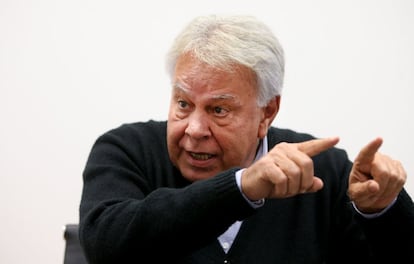“Neither the PP nor the PSOE should stop the other from governing”
Felipe González lays out his point of view on the current political situation in Spain


It’s been 20 years since Felipe González walked out of the Spanish prime minister’s office, and 19 since he stopped heading the Socialist Party (PSOE). Yet his influence on the party and on society has only grown in all this time, especially now that the country is in the grip of a political crisis of unpredictable consequences and with no easy solutions.
In an interview with EL PAÍS, González explains his point of view on the current situation, and offers a framework for finding a way out of the political impasse.
The former head of government holds that the country’s two main forces, the Popular Party (PP) and the PSOE, should set aside concerns over their own future and put Spain’s interests first.
González says that acting prime minister Mariano Rajoy’s decision not to stand for office at the upcoming investiture session due to lack of congressional support, yet preventing another party leader from doing so, is “irresponsible.”
“For some time now, the system born out of the Transition and the 1978 Constitution has been showing signs of wear”
He also warns about the risks of an alliance between the Socialists and Podemos, a party that he says is trying to “liquidate our democratic framework of coexistence, and while they’re at it, liquidate the Socialists as well.”
While he does not defend any specific party combination, he would rather see a progressive government with a reform program, although he sees this as a difficult option because there is no such majority in parliament right now. In any case, he believes that neither the PP nor the PSOE should prevent the other from forming a government if they themselves cannot.
Question. Do you feel that the current crisis could be proof that Spain’s political system is in crisis?
Answer. For some time now, the system born out of the Transition and the 1978 Constitution has been showing signs of wear. After more than three decades that can only be described as a historical success for Spain, the system needs reform and regeneration. But existing attitudes based on either doing nothing or on liquidating the entire system are giving us very little leeway for the kinds of reforms that are increasingly necessary.
“There is a very strong rejection of Rajoy, who is refusing to accept his responsibility as head of the PP and of government”
The financial crisis and its terrible economic and social consequences have fueled the feeling that change is required. Many citizens feel that certain rights that they feel entitled to, in health and education for instance, are now endangered. People have also suffered from unemployment, wage devaluation, job instability and the ensuing loss of dignity in work. And now that a fragile recovery is underway, citizens see that inequality is not being corrected. And the weariness is growing apace with the constant trickle of corruption cases.
So we are effectively experiencing something like the end of a cycle, but without seeing a reform project that is essential to Spain. In the 1980s we knew where we were and what we wanted to be, but like at other times in our own history, it seems like we’ve gone off course and no longer know where we are headed or who we are. Spain is lacking a reform project.
Q. So why did the PP win the most votes?
A. The right-wing vote is more concentrated around the PP than the left-wing vote is around a single party. But the really relevant fact is that the PP has been unable to interpret the outcome for what it really is: a defeat. Not just because they lost nearly 60 deputies, but because they are being rejected by all other parties.
There is a very strong rejection of Rajoy, who is refusing to accept his responsibility as head of the PP and of government. There is an equally strong rejection of Podemos leader Pablo Iglesias over his policy of liquidation. But neither one wants to see it that way.
Q. What about the Socialists? Has the PSOE properly interpreted the election outcome?
A. That erroneous reading also affects the Socialist Party, which was clearly defeated at the polls.
Q. Is there a progressive majority in this parliament?
A. I wish there were, because that would be my preferred option for Spain. But I don’t think there is. That does not mean there is a conservative majority, either. Thus our current difficulties.
Q. So who should try to form a government?
A. The logical thing would be for the minority with the greatest representation to try, and that is the PP. But Rajoy’s decision not to bid for reinstatement yet refusing to step aside is so irresponsible that it is hard to put a name to it. What is he trying to do? See others crash and burn and then offer himself as the only solution? Is he thinking only of himself, without thinking of Spain’s interests?

Q. Do you believe that a government where the only thing in common is being anti-PP is legitimate?
A. I don’t like “anti” governments, whatever they are against, although I have lived through them myself. Remember the “Go Away, Mr González” campaign? Governments should be there to carry out policies, not to negate those of others.
But it’s not a problem of legitimacy, as you say. It’s obvious that the reforms Spain needs will require the support of the PP in many cases, because that is the reality of our parliament. At the same time, it seems logical to call on the PP to say what it is prepared to do out of conviction, and as such, it is logical to expect it to act accordingly, whether it is in government or in the opposition.
Q. Are you in favor of a grand coalition between the PP, PSOE and Ciudadanos?
A. Absolutely not. It looks to me like a proposal born out of failure, and it will not ensure the governability of Spain in the medium term. The failure stems from a strategy that some call the “government of the Ibex,” a PP-Ciudadanos alliance that creates a squeeze effect against the Socialist Party by supporting the rise of Podemos. Do you remember Rajoy on December 6 encouraging Iglesias? “You’re doing well, Pablo, you’re doing well,” he said to him.
But that failed, and they moved on to the slogan “Let's save Private Sánchez,” which was designed to sink the candidate by making [Socialist leader Pedro] Sánchez responsible for the stability that they were defending.
To top it off, handing the opposition space to Podemos is a really stupid move, rather than just a mistake, which is generated by their lack of vision for Spain in the medium term. Look, if they don’t carry out the reforms that we need, including democratic regeneration in the face of the rampant corruption that confronts us every day, we are helping feed those who want to liquidate the democratic framework that we currently enjoy.
“This is a moment more of short-term, opportunistic sidesteps, or of personal survival as in Rajoy’s case, than of long-term visions that would provide answers to the challenges facing Spain”
Q. What, then, would be the best government possible?
A. That’s a lot to ask in an interview like this one, but I believe the time has come to consider our citizens and drop the kind of card-sharp strategies we saw last Friday. No one will be surprised to hear that at this stage in my life, I would rather see a government with a program for Spain that has been agreed upon, even if it is not the government that I am the most keen on personally.
We can count the number of congressional seats in two ways: as those on the left and the right, or as those who have signed up to a reform project for Spain, an axis with no place for those who want to end that reality or put it at risk.
If political parties were talking about government policies rather than parliamentary combinations that are incompatible with government stability, the answer would be less complicated.
But this is not the current climate. We are seeing just another moment of short-term, opportunistic sidesteps, or else of personal survival as in Rajoy's case, rather than a moment of long-term vision that would provide answers to the challenges facing Spain.
“We need to mend the fractures to social cohesion caused by the policies enacted during the crisis”
Q. Any examples of those short-term sidesteps?
A. One example: PP and Ciudadanos have 163 deputies. On the other hand, the PSOE, Podemos and United Left have 161 deputies. This last option would be a kind of tripartite.
So the PP could try to form a government, either with Rajoy or another candidate, along with Ciudadanos.
It could also be the PSOE, by talking and negotiating with Ciudadanos, and approaching the amalgam of Podemos while underscoring the essential elements required to talk about a government for Spain.
In short, we have to understand the new reality that voters want: they are asking for dialogue and agreements. And there could be a repeat situation, except in worse conditions, if the political leaders don’t assume the outcome of the vote and return the responsibility over to citizens in new elections.
Q. And a PSOE government with Ciudadanos? Do you see that as a possibility?
A. Reaching an agreement with Ciudadanos would mean having a basis for the reforms that we need. But if we are talking about a government of reform and progress, we need to have the number of deputies to support it. The PP needs to clarify whether its policies, which are still in the shadows, stem from conviction or from opportunism. Because there will be no important reforms if the PP vetoes everything.
Q. What do you think a progressive project would be at the current time?
A. We need to mend the fractures to social cohesion caused by the policies enacted during the crisis, and we need to do so with criteria based on sustainability, with a view on the moment in which Spain and the world find themselves.
We have to return the dignity to people’s jobs, make them less precarious, improve salaries and link pay to productivity. We also need to reconfigure our system of universal healthcare; reach a cross-party pact on education in general and vocational training in particular; and offer real support, not just with words, for research and innovation in order to improve our ability to compete and to create decent jobs.
“I am worried about Spain being irrelevant in the engine room of the European Union, because the process is one of shared sovereignty, not of handing over sovereignty”
Q. Do you believe that the PSOE should negotiate with the PP?
A. It is indisputable that there should be dialogue with the PP. It’s quite another thing whether there will be a margin or not to agree on things that would facilitate the reforms I just listed. The style of the Rajoy administration has been one of decrees and impositions without any kind of dialogue, and that is what we need to try and get over. In a democracy you have to respect the mandate you have received from voters, and that includes unreserved dialogue.
Q. How important is Europe in the search for a solution to the current crisis in Spain?
A. I am a pro-European who is critical of the errors made by the European Union in the fight against the crisis. I’m seriously concerned about the challenges the EU faces with regard to issues that cannot be avoided: refugees, the British referendum, security risks and more. But I am also very concerned that the subject of the European Union is missing from our own campaigns and from the current debates.
I am worried about Spain being irrelevant in the engine room of the European Union, because the process is one of shared sovereignty, not of handing over sovereignty so that others can make decisions for us.
English version by Susana Urra and Simon Hunter.
Tu suscripción se está usando en otro dispositivo
¿Quieres añadir otro usuario a tu suscripción?
Si continúas leyendo en este dispositivo, no se podrá leer en el otro.
FlechaTu suscripción se está usando en otro dispositivo y solo puedes acceder a EL PAÍS desde un dispositivo a la vez.
Si quieres compartir tu cuenta, cambia tu suscripción a la modalidad Premium, así podrás añadir otro usuario. Cada uno accederá con su propia cuenta de email, lo que os permitirá personalizar vuestra experiencia en EL PAÍS.
En el caso de no saber quién está usando tu cuenta, te recomendamos cambiar tu contraseña aquí.
Si decides continuar compartiendo tu cuenta, este mensaje se mostrará en tu dispositivo y en el de la otra persona que está usando tu cuenta de forma indefinida, afectando a tu experiencia de lectura. Puedes consultar aquí los términos y condiciones de la suscripción digital.










































